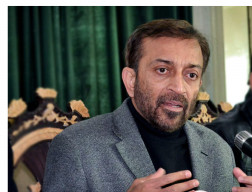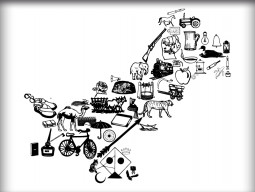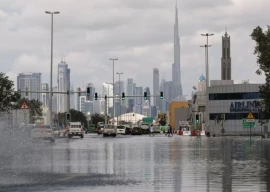
Political manifestos can be tedious and unconvincing, especially when hurriedly put together just because another political party has already published one. This makes manifestos end up reading patchy and disjointed. Genuine manifestos don’t appear overnight — this is a process that may take many weeks or months at the very least. It takes working papers and repeated drafts on vision and needs, before the thinking and widened discussion culminates in a realistic means of achieving goals.
Political manifestos also step back in time to take stock of the country’s economy and social conditions — whether five, 25 or even 65 years in the past — to identify, comparatively, what’s been achieved, what needs to be done and whether any difference has been made to the lives of the majority. The manifestos of the main parties do none of that, although, at least, one of them indulges in narcissistic fiction.
These manifestos fail to reflect the primary needs and rights of urban labour, rural workers, peasants, smallholders, small and microenterprises at the outset, and ignore women and minority rights. Political parties want these vote banks but won’t give them proportional representation in parliament. Their manifestos just tell voters what’s on offer.
Most manifestos seem to be reactive rather than proactively addressing fundamental gaps in development. Also, what political parties say on television regarding their manifestos hardly matches what is in print. They remain fixated on biradari, while some rallies have degenerated into unseemly potshots at opponents.
Most parties are effectively confined to urban middle- and upper-class interests. That a state’s first duty is to provide the basics to all citizens is something which has escaped the formulators of manifestos. All claim that top priority is given to poverty alleviation but they deal only with symptoms without addressing root causes, or devising practical, democratic solutions.
There is not much qualitative difference in manifestos, except when it comes to minor details. All push exports to the hilt, all want more foreign investment and privatisation, all will do their bit for women, but none seem to see the rising hunger, unemployment and foreign debt as immediate priorities, for which there is a way out. No manifesto mentions land reform. Worst of all, agriculture is a major sector and one on which our industries, exports and food security hinge, farming as a simultaneous source of livelihood and productivity for the people, gets very little attention.
When hunger and unemployment hit us, along with the global financial crisis five years ago, the situation necessitated the immediate resuscitation of small-scale agriculture. By now, there could have been substantial recovery, but even that was not done.
Most manifestos seem to be oblivious to the warnings of the United Nations against the relentless degradation of fragile farm soils, and the cost to life and livelihood, unless there’s a return to ecologically safe farming. It just makes an inevitable task harder and slower, maybe impossible.
The greatest scope for jobs for the people and achieving higher productivity at lower cost still lies in the land, using which small farmers and peasants can become small entrepreneurs. Even in the urban areas, it is the millions of small enterprises that not only cater to the local economy but are also the marketing and consumer base that industries build on.
Reaping rewards from the land, in turn, would require credit, preferably from local public banking services (autonomous and free of political interference). These were set up for smallholders at low interest — that is an enormous gap still waiting to be filled. Local business would have plenty of investment opportunities to put up silos and related equipment, instead of condemning so much of our harvests to spoilage, because of lack of proper storage.
There is a huge need for long-distance, economical, reliable, quality transportation, crisscrossing to the furthest markets inland. This can be best provided by the railways, but ‘wheeled’ and other related national and multinational interests pose blockages, although it puts the poor at a disadvantage and makes the economy more expensive.
Politicians constantly condemn the middleman and talk about eliminating them, which is not realistic. This is because the government doesn’t provide alternatives or incentives for them. Unless the small farmer wants to increase his burden by doubling as his own salesman, what is most needed are agencies that are not thekedars in disguise, but whose business is in the ongoing collection, purchase and transport of produce, from the smallest village-centre to the market at standardised rates. Only then can smallholders ever hope to escape from the continuous debt trap of predatory money-lenders or feudal landlords, or factories that buy directly but don’t pay for months or years on end.
All parties are in favour of increasing allocation to education. But none qualify it with relevance of content, such as more rural and agriculture-oriented syllabi for the countryside, doing away with rote culture, emphasising on fundamentals of agroforestry and eco-agricultural knowledge for a finite world, to be internalised by the urban and rural child alike.
Politicians, without being conscious of it, still think in terms of a top-down, command economy, controlling all working people directly or indirectly, not allowing the peasant, especially, to be autonomous. They believe in private property and private enterprise, but only in terms of the bigger businessman. Patronage sticks like glue to their idea of government.
Until parties accept the basics of an economy such as social services and credit, as a right, and first lay them down as bedrocks serving smallholders, peasants, self-employed artisans and urban producers, and well-off businessmen alike, there will never be an economy bringing prosperity to all because it is undemocratic, even though it may bring high GDPs and great wealth for a few based on monopolies, cartelisation and privatising national assets.
Yet, if just water and sanitation were the sole promise, that might get the most votes. People at the top can’t see how that makes much else possible for the poor.
Published in The Express Tribune, May 7th, 2013.
COMMENTS (6)
Comments are moderated and generally will be posted if they are on-topic and not abusive.
For more information, please see our Comments FAQ


















































@Ricky: It does not take rocket science to figure out that Pakistan is 155th worst performing country out of 175 countries in terms of tax-to-GDP ratio standing at 9% (most of the countries below us are energy based economies and don't need taxes to begin with). PTI has provided full fledged details in its economic policy on how the fiscal space will be created for additional expenditure on education and healthcare. As far as the 90-day mantra is concerned, you know it and I know it as well what IK meant (which is to eliminate corruption at the cabinet level in 90 days). So why exaggerate? Most of the liberals on ET have issues with PTI's counter-terrorism policy (certainly understandable) but they take out their anger by ignoring every other good thing that might have been done by PTI. Educated people of this country need to get up from their comfy couches and do more research rather than sitting around criticizing others who are at least trying to make a difference!
Clearly you didn't bother to go through PTI's.
A balanced and thought provoking Op Ed, thanks ET for that. The problem in Pakistan is that we are idol worshippers. We have lifetime chiefs of almost all political parties and yet they attack each other of hereditary and dictatorial politics. Asghar Khan, Imran Khan and Sharif have been their party chief longer than BB or Zardari has been. Their supporters do not look at the manifesto but at the slogans. Every curse of society would be cured in 90 days, every economic achievement would be in 90 days and the list goes on and on. The social services would be for every poor, hungry, unemployed and so on but without any details in the budget. Nobody tells us where would all the additional expenses in the budget come from? What kind of non productive defense programs would be eliminated, etc? We want a magic wand and we have the leaders for that. The leaders who have never worked for a living and are living of other people’s money would solve poor people’s problems. It is like I have no kids and not married but would take care of all your families and kids!
I don't think it is a well researched article. I know for sure PTI has mentioned in its manifesto of indirect land reforms and in its economic policy about agricultural credit and in its environmental policy about agricultural reforms (on that note, PTI also has a water policy and stand-alone agriculture policy that were prepared internally but were not published). As for the customized education for urban vs. rural, writer's view point is problematic since this will lead to different curriculums unnecessarily, which over time will accentuate urban-rural divide. Furthermore, this will be economically inefficient.